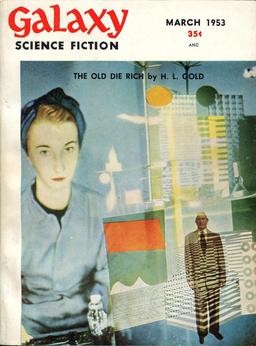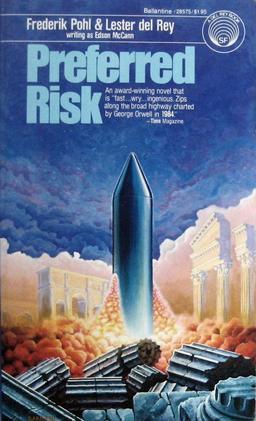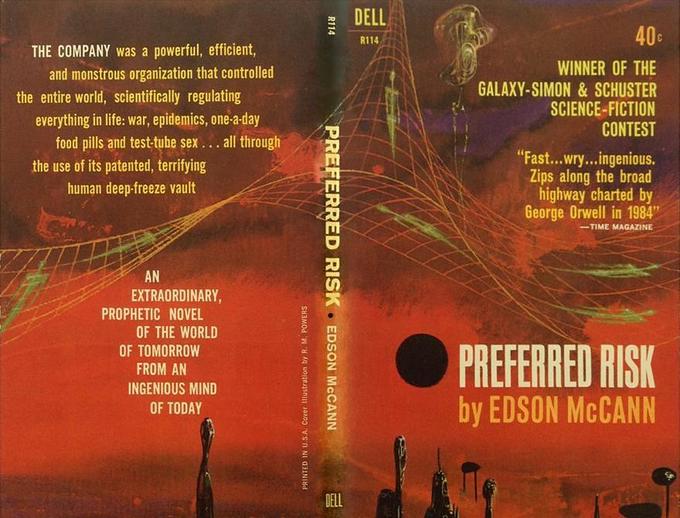The Galaxy Science Fiction $6,500 Novel-Writing Sham
 In the March, 1953 issue of Galaxy Science Fiction, H. L. Gold announed a novel contest. Simon and Schuster and Galaxy partnered together to offer a $6,500 prize, “guaranteed to the author of the best original science fiction novel submitted.”
In the March, 1953 issue of Galaxy Science Fiction, H. L. Gold announed a novel contest. Simon and Schuster and Galaxy partnered together to offer a $6,500 prize, “guaranteed to the author of the best original science fiction novel submitted.”
The $6,500 was only a minimum for the first world serial and TV rights. It was the largest cash prize offered to date for a science fiction novel. Other details were that the contest closed October 15, 1953, and the novel had to be between 60,000 and 75,000 words. Anyone could enter, with the following caveats:
…except employees of the Galaxy Publishing Corp. and of Simon and Shuster, Inc., and their families; AND authors who are ineligible because of contractual obligations to their present publishers… which means, in effect, that contestants will NOT be competing with most of the established ‘big names’ of science fiction.
When you consider that cars could be purchased for about $2,000 in 1953, this was an enormous prize. And let’s face it: how many of us would still be happy to sell a novel in today’s market for $6,500?
Given that the contest ended long ago, I had to find out who won. The winner was Edson McCann, whose novel Preferred Risk was serialized in Galaxy in 1955 and later published by Simon and Schuster that same year. Congratulations, Edson!
Oh… except there never was an Edson McCann.
And this is the part of the story that makes me lose respect for Gold. Out of all of the submissions Galaxy received, Gold didn’t like any of them. So he approached Frederik Pohl and Cyril M. Kornbluth to find out if they would enter the contest with their latest novel (albeit under a pseudonym). But they declined.
Galaxy’s deadline passed, and Gold had nothing to show for it. At least, nothing he wanted to show for it.
Pohl, meanwhile, had been working on another novel — this time with Lester del Rey. Gold liked the story and wanted it as the contest winner.
 Never mind that the contest had already closed. Never mind the clause about the prize “guaranteed to the author of the best original science fiction novel submitted.” In my mind, “best of submitted” doesn’t necessarily mean it’s a great novel; it means it was the best of those submitted. Never mind that “contestants will not be competing with most of the established ‘big names’ of science fiction.” Oh, wait; it was only two of the names, so perhaps that aspect held up.
Never mind that the contest had already closed. Never mind the clause about the prize “guaranteed to the author of the best original science fiction novel submitted.” In my mind, “best of submitted” doesn’t necessarily mean it’s a great novel; it means it was the best of those submitted. Never mind that “contestants will not be competing with most of the established ‘big names’ of science fiction.” Oh, wait; it was only two of the names, so perhaps that aspect held up.
Pohl and del Rey agreed to go through with it, inventing a pseudonym of Edson McCann. The story behind McCann was that he was a nuclear physicist who was working on top secret projects; therefore, he couldn’t risk public appearances or book signings. Such a dedicated, honorable man!
The secret leaked out, obviously, but I don’t know of any serious repercussions to Gold, Galaxy, or Simon and Schuster. I do know that they never had any other novel contests within Galaxy. But what this illustrates to me is that Gold wasn’t really that open to new authors. In fact, if you look at some of the past issues I’ve reviewed, you’ll see cases where established authors have two stories in a single issue, using a pseudonym for one of them. Or Gold himself injects his own story using a pseudonym. In fact, the March 1953 issue begins with one of his stories, though he actually uses his own byline.
But worse than being closed to new voices is the fact that Gold didn’t uphold the rules of the contest. It became a sham. I don’t think that’s what he intended from the start. Perhaps all of the submissions were poorly written, and he felt desperate. But he should have worked with what he had.
I’ve entered contests in the past; in fact, I’m in one right now. If I found out the winner wasn’t one of the entries, I would feel cheated. And I hope those unpublished authors of 1953, if they ever found out the truth, also felt a strong sense of injustice.
Decades have passed, and whatever the fallout was, it may be well forgotten by now. After all, later copies of the novel listed del Rey and Pohl as the authors rather than McCann.
But what editors can learn from an incident like this is the notion that new voices deserve respect. We aren’t all writing like Pohl, Kornbluth, or del Rey, but that’s not necessarily a bad thing. If you hold a contest or ask for submissions to an anthology, use the submissions that you receive; don’t e-mail your buddies Pohl and del Rey for something “better.” And if you have a magazine where Pohl and del Rey are submitting regularly, bring in a story by an authentic nuclear physicist from time to time. The results of innovation shouldn’t be new pseudonyms; rather, the results of innovation should be unique stories from new authors.
Matthew Wuertz’s last review for us was the February 1953 issue of Galaxy Science Fiction.

Horace Gold was not closed to new voices, as you say; it just wasn’t true. And it was a fact that he was indeed hard up for a winning novel for the contest because all of the ones submitted were lousy. I quote from my 1977 interview with Fred Pohl:
TANGENT: In the 1955 Galaxy novel contest you and Lester del Rey under the pseudonym of Edson McCann won first prize with Preferred Risk. Could you explain how and why you two got together on that? Was Horace Gold really hard-up for a good novel?
POHL: Horace Gold was extremely hard-up for a winning novel. He had a large number of selections. He had an apartment on East 14th Street and one room of it was wall-to-wall cardboard boxes containing novels. I helped Horace by reading manuscripts for him from time to time, and I read quite a few of them, so I know the ones I read were awful. For good reasons, that kind of contest never really works. I can explain theoretically why it does, but the observed fact is that it does not work. He asked me if I would let him publish a novel Cyril and I had written, Gladiator-at-Law, as the prize-winner, under a pen-name, and I said positively not. And he said, well, what am I going to do? I have to have a winning novel. And I said well let me talk to Lester, and I came back to Red Bank to talk to Lester – who had come to Red Bank to spend the weekend with us, but was still there eight months later. In fact, he bought a little house down the road from us and was there for about seventeen years – but we talked about it and we decided to write a novel…which, if I had written it or if Lester had written it, it would have been very good, but the two of us together did not function well. The chemistry was wrong. I hate the novel. He’s a much different kind of writer. He, at that time in particular, wrote in bursts and planned out what he was going to do ahead of time, and both of those are antipathetic to me.
And here’s a link to the entire interview:
http://www.tangentonline.com/interviews-columnsmenu-166/2216-classic-frederik-pohl-interview
I don’t know how this was received at the time, or how soon it was revealed that “Edson McCann” was Pohl/Del Rey (kind of soon, I imagine), but the reaction I’ve noticed most often recently is kind of: “Shame on all those new authors for sending Gold unpublishable crap, and forcing him to turn to this subterfuge.”
I agree that Gold violated the terms presented … but if the actual submissions were really bad, I can understand his response.
In a way, I agree with Rich. Gold absolutely had a duty to those writers who submitted. But I think he had a far more important duty to the readers of Galaxy, to not slough off inferior work on them just because he’d made that promise in a contest. If he’d filled the pages of Galaxy with work that didn’t belong there for three long issues (the length of a typical serialized novel), he’d have been guilty of a bigger crime than what he did, I think.
What bothers me about it is that it was seemingly open to new writers, and when nothing met Gold’s expectations, he went against the rules – accepting a piece after the contest closed and from professional authors. If those involved didn’t think it was wrong, they wouldn’t have invented a story around the pseudonym.
Without knowing exactly what was submitted, we don’t really know the quality of the work. Maybe they were all horrific. But even American Idol picks someone to be the winner. Surely Gold could have taken one of the submissions and worked with it. Maybe I’m overly optimistic. Or maybe he should have written the rules differently…
Dave,
Thanks for the post and link to the interview. It’s interesting that Pohl hated the novel.
Perhaps going as far as saying Gold wasn’t open to new writers is a bit harsh. But this contest bothers me on some level.
Would it have been better, perhaps, to declare that there was no winner? Or something else that wasn’t dishonest?
Del Rey, by the way, was pulling some similar stuff in the magazines he was editing at about that time — SPACE SCIENCE FICTION, the first SCIENCE FICTION ADVENTURES, maybe there was another … Anyway, he was editing them under his own name, and selling them stuff as by “Philip St. John”, or perhaps vice versa.
(Of course, the phrase “his own name” applied to Lester Del Rey is fraught with all kinds of additional implications.)
Matthew, I think the fact that Gold wanted novels only from new writers showed that he was, indeed, welcoming to new talent. That it didn’t work out put him in a real bind, to say the least. He was caught between a rock and a hard place, wasn’t he? And Fred said that in theory it looked like a good idea, but in practice it just didn’t work. Like John said, I think Gold’s allegiance was to Galaxy’s readers which would trump running a crap novel when the contest didn’t work out. The promise to publish the winning novel really bit Gold in the ass when all the novels were el stinko. 🙂
While there are perhaps other reasons to judge Gold harshly, I don’t think lack of openness to new talent was one of them. And he just made a very poor (one off) decision when it came to the contest rules. Live and learn.
Rich, “his own name”, as you mention, in re Lester is fraught with implications in this context to say the least. As you know, one version of his name has about 6 or 7 hispanic middle names before you get to Del Rey, so he could mix and match any number of them for pseudonyms if he wanted to.
Gold, Pohl, and del Rey acted shamefully.
Gold would have been better advised to print a brief statement apologizing for not thinking through his rules better and acknowledging that he’d thereby not served the magazine and its readers well though his intentions had been good. It appears that he did not say he would -print- the winning novel, just that he would pay $6,500 for the best one submitted. He should have paid someone that amount and told her or him that he would cite the author’s name if she or he wished, but was not going to print it as not up to standard. Yes, that financial loss would be a painful lesson to him. But it would have been the right thing to do.
If his publisher (whoever that was) would not permit him to pay $6,500 for “nothing,” then at the least Gold should have quietly apologized as just indicated and stated that there would be no award. I’m imagining a couple or so sentences tucked into an editorial.
Major Wootton,
I agree there could have been other actions taken besides falsifying the winner.
I don’t think Gold and Simon and Schuster considered the possibility of a non-winner, but given one rule in particular, I’d be surprised if the thought hadn’t crossed someone’s mind:
“There will be only ONE winner, but all other submissions of merit will be given full consideration for possible serialization in Galaxy Science Fiction Magazine, book publication by Simon and Schuster, or both, at standard rates.”
So they did note “submissions of merit” in that part. Meaning that if they found other really good submissions in addition to the winner, they might also find their way into the pages of Galaxy. So why not apply the “submissions of merit” as a criteria for a winner as well?
Someone could jump in and say, “See? Gold was so open to new authors, he was willing to take even more novels if they came in through the contest.” Maybe. But he didn’t use any of them in this case. 🙂
[…] found out about this via a post the other day on Black Gate, where Matthew Wuertz […]
[…] found out about this via a post the other day on Black Gate, where Matthew Wuertz […]
[…] found out about this via a post the other day on Black Gate, where Matthew Wuertz […]
[…] discussed in detail by Matthew Wuertz at the Black Gate (as of August 14, 2021, not accessible) and Charlie Jane Anders at Gizmodo (quoting from Matthew […]